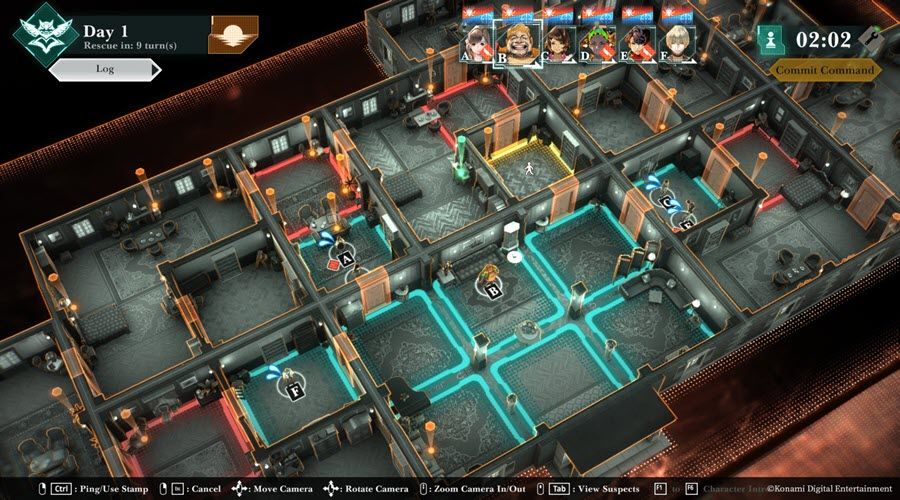CRIMESIGHT

Review
London, 2075. As in Minority Report, an advanced AI called Sherlock is able to predict future crimes before they happen. At the same time, a powerful and evil AI named Moriarty is completely devoted to committing crimes. The game’s objective changes depending on which side players have been assigned. While being essentially a turn-based social deduction game (a mix of Among Us, Cluedo and Chess), every match has some sort of strategy involved and even some luck (due to random factors). Learning the gameplay mechanics feels like playing chess for the first time; a bit complicated, but there is a very detailed tutorial that covers every aspect, so it’s advised to follow it step by step.
The game takes place inside a mansion that six anime-kind-of strangers are unable to leave due to a terrible storm. One of these is the killer, while the others must do everything they can to avoid the target being murdered while waiting for help to come. Each turn is a time of the day (morning, afternoon and evening) in which Sherlock’s players can move three different characters to make them explore the mansion, mainly looking for food (which is fundamental to their survival). They don’t know who the killer and his target are, so they must pay close attention to the characters’ distance. At the end of the day Sherlock will reveal if the killer is close to the target, based on everyone’s movements. The target must survive until the morning of the 4th day, which will also be the final deduction phase where the identity of the killer will finally be revealed if players have collected enough clues and made deductions.

On the other side, Moriarty’s players can only move two pawns each turn (excluding the target). Not only do they know the killer and target identities, but also every item located in the mansion, including food and weapons. They even have the priority of action, so if two players try to move the same character, only Moriarty’s action will be performed. While this is extremely helpful in a variety of situations, it can also backfire against Moriarty’s players by revealing the identity of the target, which they are unable to move. In order to successfully commit a murder, there are three basic rules:
- The killer must be in possession of a weapon.
- The killer and the target must be in the same area.
- There must be no other characters in the same room.
When these conditions are met, Moriarty’s player(s) can give the order to kill his target. If one of the conditions is missing, then the assassination will fail and the killer’s identity will be revealed, making it easier to defend the target. That’s not all, though. Every character must be fed once per day, otherwise they will be affected by different effects such as slower mobility and blindness which will give the killer a greater advantage. Other random events may also occur, such as stray dogs entering and attacking guests. Occasionally, there will also be a third AI called Irene, whose aim is to assist Moriarty’s masterplan and provide fake clues to mislead investigations.
There are multiple game modes, such as 3vs1, 2vs2, 2vs1 and 1vs1 with players randomly assigned to the AI’s teams. While in most of these modes there will only be one player sided with Moriarty, in 2vs2 there will be another player on his side, sometimes playing as Irene too (depending on the game settings, which can be customized). Playing 1vs1 feels like an intense chess game, but I found the 2vs2 to be the funniest experience, as it requires that you understand which ones are Moriarty’s players or, if you are the killer, to confuse Sherlock’s ones with your moves. There isn’t a text chat, but a limited set of stickers we can use to communicate with other players. We can also block communications for those we suspect to be working for Moriarty, so they can’t see our messages with the other players. In a game where communication is key, seeing 144 stickers being locked behind the purchase of a soundtrack is simply wrong and limits the chat functionality.
Unfortunately, the gameplay is not paired with a level design of the same quality. There are only three maps to choose from with little to no variation, which inevitably causes an increasing sense of repetitiveness. This probably pushes many players to quickly abandon the game and I must admit it’s often hard to find available ones. I spent quite some time in the lobby looking for an open room, only to see a few 1vs1 ones and occasionally a few 2vs2. Some of the players I encountered were high levels, which meant there were only a few aficionados left who had been playing the game since launch. This isn’t entirely the game’s fault, but more a lack of proper marketing and adequate post-launch support. The price is very accessible and the game can be really fun, yet it looks rather limited and we have to see if it will be updated with free content.
CRIMESIGHT is a very interesting and original social deduction game, which unfortunately is limited in terms of variety. It’s a very niche title with its fate strictly tied to Konami’s marketing and post-launch support, which doesn’t seem to be enough right now. New players could easily feel discouraged while looking at the empty lobbies and without a single player mode, but with more characters, maps and dynamic events, CRIMESIGHT could be an awesome social deduction game.
Review written by Sonic Punk for Zeepond.com
Positives
+ Intriguing strategic turn-based social deduction game+ Deep and explanatory tutorial
+ Good-looking anime aesthetic
Negatives
- No single player mode and online is almost dead- Limited number of stickers to communicate (others are locked with the soundtrack’s purchase)
- Only three maps with no variation
- Unknown roadmap/post-launch support
Review Summary
CRIMESIGHT’s social deduction formula is fun and original, but desperately needs to be revamped with more content and free updates.
Share this review!
Zeepond Rating: 7/10










Video
Game Categories
All Game Reviews (1356)Hardware Reviews (0)
Action (341)
Adventure (151)
Alpha Games (2)
Anime (5)
Board Games (3)
Casual (135)
First Person (19)
First Person Shooter (30)
Hardware (0)
Horror (38)
Massive Multiplayer Online (4)
Pixel Graphics (23)
Platformer (94)
Puzzles (65)
Racing (26)
Role Playing Game (62)
Simulation (53)
Sports (20)
Strategy (246)
Third Person (12)
Utility software (1)
Virtual Reality (22)

